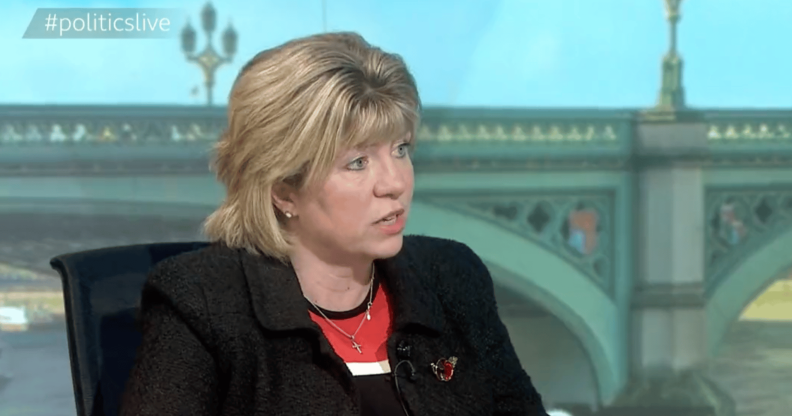New women’s minister defends troubling abortion clinic vote: ‘I’m allowed to have a personal view’

Maria Caulfield voted against plans to enforce buffer zones around abortion clinics.(BBC/Politics Live)
Maria Caulfield, the newly-appointed minister for women, has defended voting against abortion clinic buffer zones, saying she is allowed to have a “personal view”.
Caulfield voted against plans in October to enforce buffer zones around abortion clinics in England and Wales, which were backed by MPs by 297 votes to 110.
The bill, which still needs to go through the House of Lords, would ban harassment and intimidation within 150 metres of people who attend abortion clinics.
But the new minister for women said she thinks “the definition of harassment is open to interpretation”.
Speaking on BBC’s Politics Live on Monday (31 October), Caulfield said the bill’s proposed six-month jail sentence for harassment is “not a proportionate response”, criticising Just Stop Oil’s recent climate change protests, and questioning why they did not face similar sentences.
“There’s a possibility of someone going up to a woman who may be upset or distressed, offering them some comfort, that could then be accused of harassment and face six-months in jail,” she said.
She added that she accepted the result of the vote and would uphold it, but that she was allowed her own “personal view”.
“Labelling someone because they vote a certain way on a certain vote to be ‘anti-women’… we should be allowed to have our different views and be respected,” Caulfield said on the segment.
“It’s a sad day for politics if we’re not allowed to have different views across the table.”
"I am allowed on these life matters to have a personal view, without being criticised or told I can't do my job," says Minister for Women Maria Caulfield, after she voted against abortion buffer zones#PoliticsLive https://t.co/TTK9fCa6cC pic.twitter.com/sVx99Y2p6R
— BBC Politics (@BBCPolitics) October 31, 2022
Caulfield, who voted against legalising abortion in Northern Ireland in 2019, was appointed minister for women on Friday (28 October).
She has also previously sparked concern from abortion rights groups for voting in favour of cutting the 24-week abortion time limit, reportedly calling the 1967 Abortion Act “one of the most liberal abortion laws in the world”, and urging MPs to be “wary of greater liberalisation of the law” surrounding abortions.
British Pregnancy Advisory Service (BPAS) criticised Caulfield’s voting record after the BBC segment as “profoundly disappointing”, adding that she should be speaking up for the “one in three women who will have an abortion in their lifetime”.
“Maria Caulfield voted against measures to protect women seeking reproductive healthcare from harassment and intimidation at the hands of anti-abortion protesters,” BPAS added in a statement on Twitter.
“Maria Caulfield has also led the parliamentary opposition to attempt to protect women and decriminalise abortion, and has defended the current law which threatens any woman who ends her own pregnancy without the approval of two doctors with life imprisonment.”
The director of the Centre for Women’s Justice, Harriet Wistrich, previously told The Guardian that the group was “horrified” that Caulfield was appointed the minister for women.
“The vast majority of women want the right to choose,” Wistrich said.
“Her appointment signals a potential restriction on women’s reproductive rights, which in turn is an attack on women’s autonomy and freedom.
“We hope Maria Caulfield will keep her personal opinions on the issue of abortion to herself.”

